Myanmar Journalist-Turned-Resistance Fighter Swapped His Camera for a Gun
26 May 2022

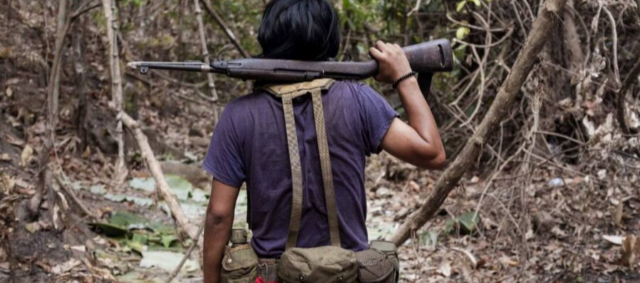
Ko Jack takes part in military training in a jungle in Karen State.
It has been more than a year since Ko Jack left behind the career he loved and joined the armed struggle to defend the people from the junta’s atrocities.
For about 10 years, he followed his passion for photography, working as a photojournalist for news organizations in Yangon. As he had a special interest in covering armed conflicts, Ko Jack traveled to several ethnic states where armed groups have long fought the military for greater rights and autonomy, telling their stories through his camera lens.
Today, he finds himself among them not as a journalist, but fighting back against the military that overthrew the elected civilian government led by Daw Aung San Suu Kyi in a coup in February last year.
Now a member of the People’s Defense Force in Karen State, the 29-year-old has taken part in five heavy battles alongside ethnic Karen forces fighting junta troops. In those clashes, more than 100 junta forces were killed and around a dozen captured.
From lens to gun
Ko Jack recalled his first battle experience in a recent interview with The Irrawaddy. He shared that despite having undergone months of military training, the first time he experienced front-line combat his old instincts returned and he immediately began mentally framing photographs of what he saw.
“Using a gun and taking pictures have something in common: you keep your index finger in a ready position. But you can’t do both [take photos and fire a gun] at the same time,” he said.
“If I started taking pictures, the gun I carry would be useless and it wouldn’t help my comrades either,” he added.
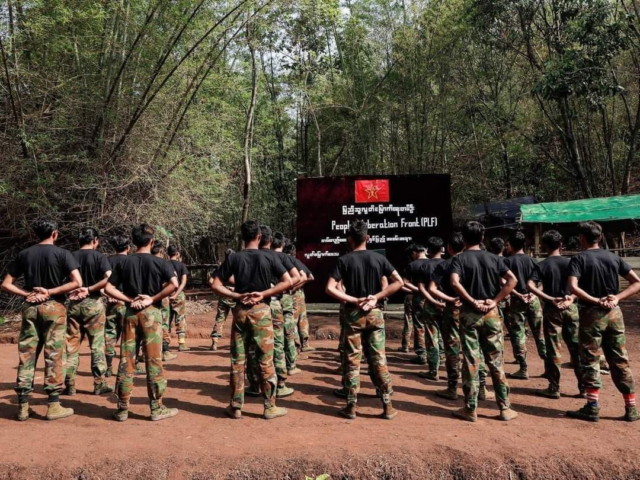
Members of an armed resistance group are seen at a ceremony to mark the first anniversary of its founding in a liberated area. / PLF
Since then, Ko Jack’s camera has been put aside and his rifle has become his top priority. And just as he relied on his strong sense of timing and focusing skills to take good photographs, he has proven to be a good shot on the battlefield.
He was even offered a promotion to section commander but turned it down, feeling he wasn’t ready for the post yet. On the front line he has become a good soldier, coordinating well with his comrades and obedient to his commander, while back at the base, he is a respected trainer among new members, sharing what he has learned with them.
The day that changed his life
For more than a month after the coup, Ko Jack put aside his personal anger at the military takeover in order to focus on his job, heading to the streets with his camera to document the anti-coup protests and the junta’s crackdown on its opponents. With his fellow journalists, he kept the world informed of the events that were unfolding in the coup-hit country and presented evidence of the violence used by the junta’s forces.
However, one day in March, witnessing the aftermath of a bloodbath committed by the junta in a suburb of Yangon convinced him that he had to take up arms.
Following the coup, numerous street protests broke out in Yangon and other cities, and junta forces responded to the peaceful protesters with lethal crackdowns and deadly shootings. Ko Jack was in Hlaing Tharyar Township one day after the military engaged in one of its worst mass killings of civilians there on March 14.
He recalls that so many bodies were taken to the cemetery that the crematorium had to work non-stop, leaving families unable to grieve properly as the funerals had to be rushed. He spent the whole day there. Some bodies were disfigured to the point of being unrecognizable with pierced heads, shattered faces or missing limbs.
The victims were protesters, bystanders and those helping the wounded, gunned down in a cold-blooded crackdown on an anti-coup demonstration in the township. During the crackdown, junta soldiers armed with assault rifles and snipers trapped protesters and shot to kill any living thing in their view. In total, the junta’s forces killed around 80 people on that day.
“I have never been able to just stand there and watch injustice unfold in front of my eyes. With the coup, and after seeing what happened on that day, I couldn’t stand and watch anymore,” he said.
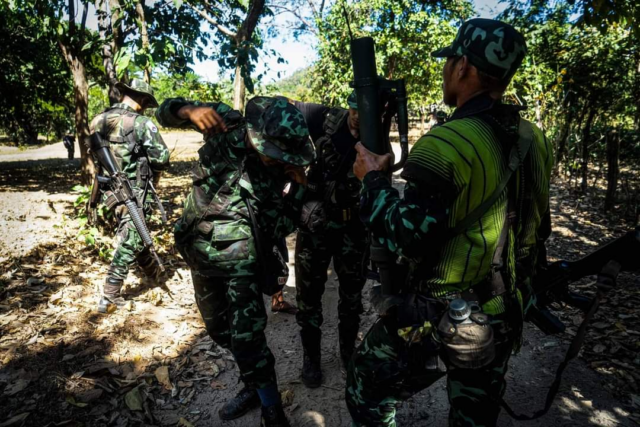
Karen National Union (KNU) soldiers are seen during a mission. / KNU
A few days later he left his home in Yangon, joining thousands of young people across the country heading to rebel training camps and vowing to topple the junta, which has continued to terrorize the population with killings, arbitrary arrests, arson and bombing attacks.
His new home is a tent. He lives in a forest without any relatives nearby. More than a year on, he misses his home sometimes, especially when he is sick. He recently caught malaria while staying at a jungle camp; his biggest wish at that time was to be able to enjoy his favorite breakfast—spicy noodle salad with rice.
Same mission
But the determined revolutionary fighter said he won’t turn back until the revolution succeeds—a conviction he shares with his comrades.
A majority of the fighters in the group are aged between 20 and 30; they come from different regions and states and diverse backgrounds: workers, journalists, medics, artists, civil servants and even some striking police and soldiers. Besides graduates like Ko Jack, who completed a degree in geology, undergrads under 20 who are boycotting the junta’s education system have also joined the group.
Like Ko Jack, none of them chose to be soldiers; all felt compelled to take up arms due to the junta’s oppression of the entire population. They are among about 80,000 to 100,000 People’s Defense Force members nationwide who have taken up arms to fight back against the junta.
They all have one mission—to root out the military, which has oppressed the country for more than 60 years, and to terminate once and for all the system of dictatorship that is despised by all Myanmar people.
Some of Ko Jack’s comrades have given their lives for this mission. During one battle Ko Jack lost two fellow fighters, both of whom were much younger than him.
Their deaths could easily have left him heartbroken and demoralised; instead, they have driven him to become a stronger fighter, even more determined to achieve victory on their behalf, he said.
Like Ko Jack, all revolutionary fighters believe that their future will be bright only when the current military under Min Aung Hlaing is defeated.
Ko Jack said that while he personally loved detained State Counselor Daw Aung San Suu Kyi as the country’s leader, the fight is not for her sake alone, but for his and his comrades’ future, and he believes other youths who have taken up arms feel the same way.
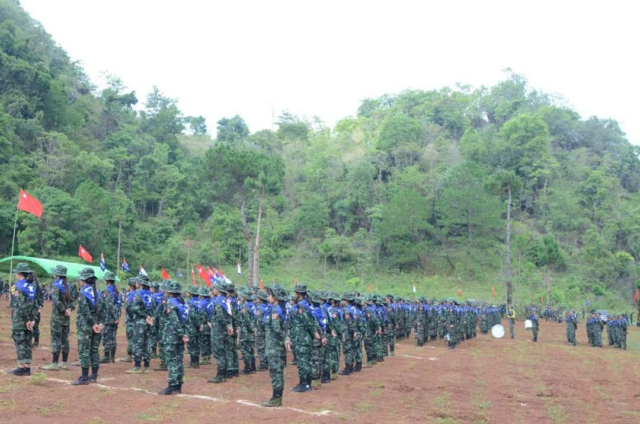
Kayah State-based Demoso People’s Defense Force members mark the first anniversary of the group’s founding on May 6. / DMO-PDF
“We, the youth, are fighting to end military rule for our future and because we are the next generation,” he said.
Referring to the junta’s recent invitation of ethnic armed organizations to peace talks, Ko Jack continued that the young resistance fighters have no trust in any negotiations offered by the junta.
“We have seen their lies and don’t believe them. For us, we will continue to fight till the end, till the junta surrenders, and till they [the military] give up their place in politics,” he said.
Ko Jack and his comrades are confident of victory over the junta troops, who are dispirited and disunited.
Even now, facing shortages of arms and ammunition, the resistance groups, which comprise determined fighters across the country, pose a serious threat to the junta’s forces—once viewed as an all-powerful military—using guerrilla warfare tactics to seize junta posts.
Ko Jack said he has noticed that several junta troops who were killed or arrested by ethnic forces in their area used drugs, adding that on the front lines they are no longer obedient to their commanders.
But the inadequate arms and ammunition are holding back the resistance’s operations. For now, only half of the members of the group are armed.
With the PDFs still not fully armed, Ko Jack bought a used AK-47 rifle on his own and has raised funds to buy bullets for himself as well as for his colleagues. Other PDF members across the country have also had to raise money themselves to buy the required weapons and food.
Ko Jack said that if the resistance forces had adequate supplies of arms and ammunition, victory wouldn’t take long.
“We could also take the cities, as the people expect, in three to six months if we had full supplies of arms and ammunition. We don’t need tanks or jet fighters to win the battle, only supplies of arms and ammunition,” he said.
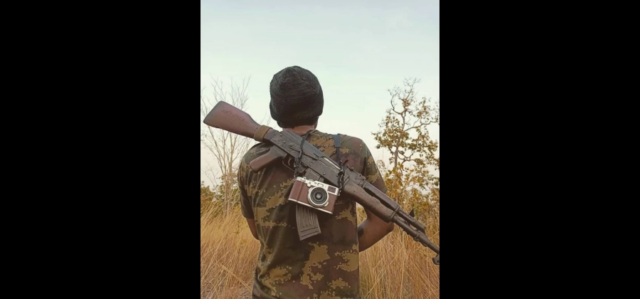
Ko Jack with his camera and gun
And the day they prevail will be the day they return home and reclaim their rights.
“When this is over, I want to return home in my uniform,” Ko Jack said. “I want to meet my parents in the battle uniform that I wore while taking part in the revolution and show them that their son did something they can be proud of.”
And yes, he will return to his camera and once again hit the shutter button instead of pulling the trigger.
Ko Jack is a pseudonym.
Original Post: The Irrawaddy
Announcements
28 February 2025
Asian NGO Network on National Human Rights Institutions , CSO Working Group on Independent National Human Rights Institution (Burma/Myanmar)
Open letter: Removal of the membership of the dis-accredited Myanmar National Human Rights Commission from the Southeast Asia National Human Rights Institution Forum

Progressive Voice is a participatory rights-based policy research and advocacy organization rooted in civil society, that maintains strong networks and relationships with grassroots organizations and community-based organizations throughout Myanmar. It acts as a bridge to the international community and international policymakers by amplifying voices from the ground, and advocating for a rights-based policy narrative.